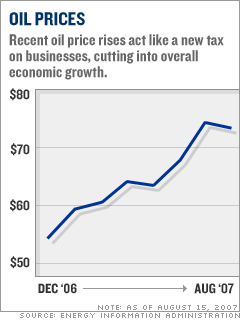Happened yet? Yes
Anyone who remembers the 1970s knows that rapidly rising oil prices can be poison to stocks. The quadrupling of those prices in the months following October 1973 (due to the OPEC embargo) helped send a market that was already reeling into brutal bear territory almost immediately.
Rising energy costs just before the 1990-91 Gulf War were bad news for the market too. That's because when oil becomes much more expensive, one of two things generally happens: stagflation or recession.
Those higher prices act like a tax on the economy, slowing growth. And because higher prices make the Federal Reserve think "inflation!" the Fed typically responds by raising short-term interest rates - something the stock market likes about as much as Nicole Richie likes dessert.
Fast-forward to today: Oil prices are up 20 percent year to date, approaching the record high of $78.40 a barrel.
"You have to expect that these rising oil prices will catch up to businesses and consumers," says Timothy Fidler, a portfolio manager with Ariel Capital.

